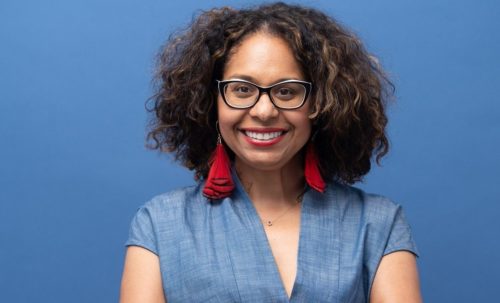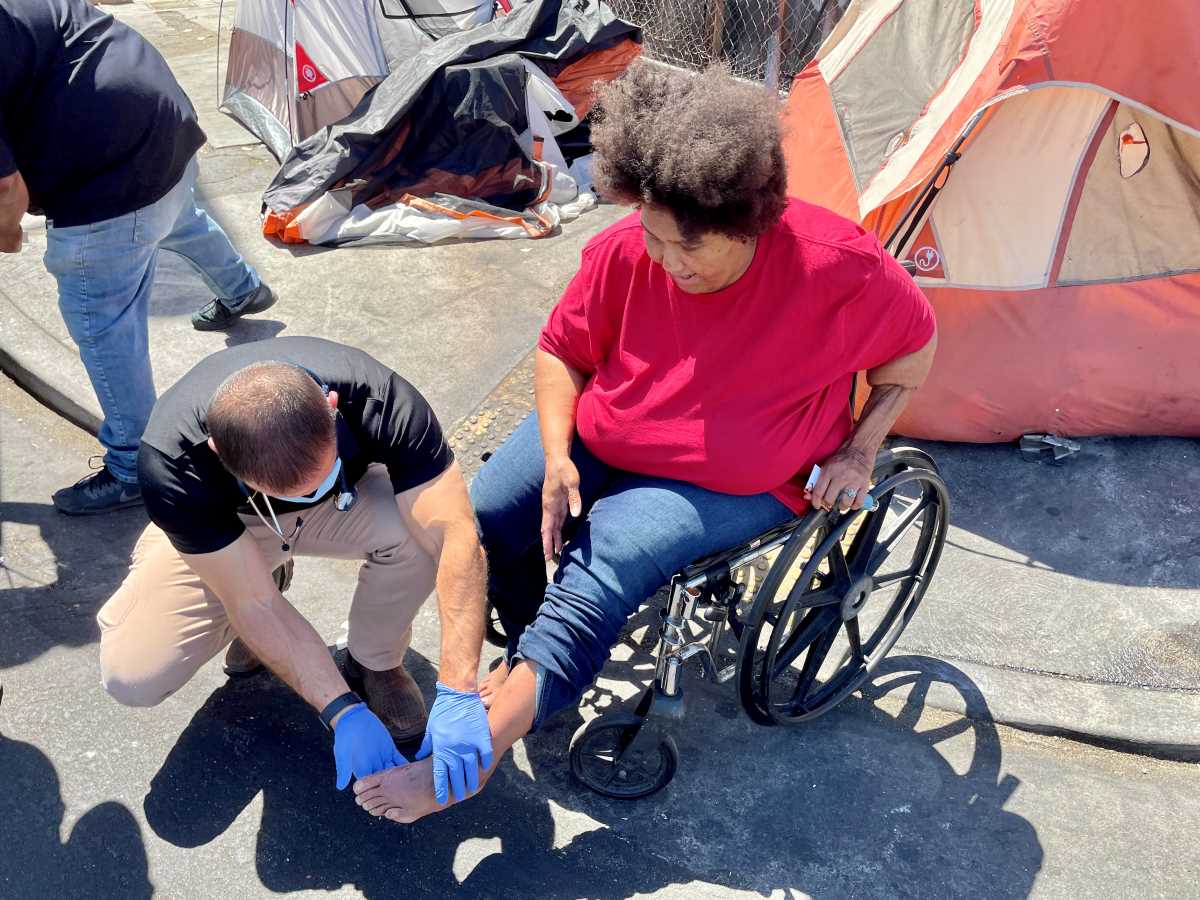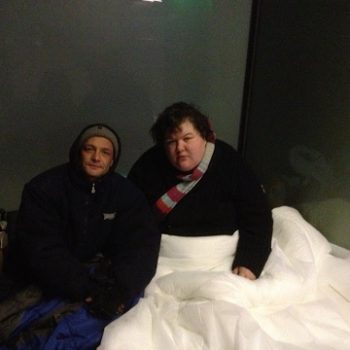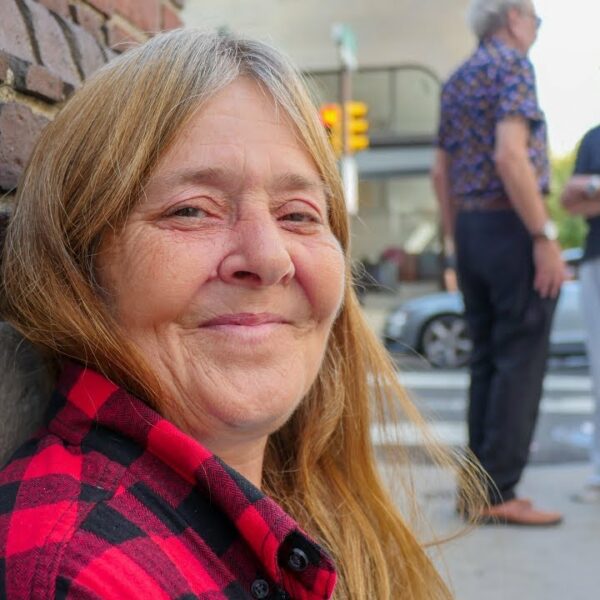The Balance: Senator Sydney Kamlager Speaks Candidly about What We Stand to Gain or Lose with AB-369
“We worked to make sure that issues are being addressed that are real on the streets, and so if this isn’t signed, then it would lead me to believe that those voices aren’t important, and I just won’t accept that.”
– Senator Kamlager explaining what’s at state as we await the governor’s signature on the Street Medicine Bill

Senator Sydney Kamlager
It is a crisp September day. Senator Kalmager and I sit facing one another from our laptop screens. We are in-between time zones and on the edge of Autumn. Everything around us is on the brink of change.
For the school-aged children, change means returning to classrooms, refilling lunch boxes after a pandemic-laden year of confusion. For the trees, change is color, and for the land, it is harvest. And today, for the first time, change could mean access to medicine for members of the California homeless community who desperately need healthcare to survive.
The bill that could bring about this sort of future is formally titled AB-369, more commonly known as the Street Medicine Bill. Today, that vital piece of legislation sits primly on the desk of Governor Newsom. His decision will be the final frontier of medical justice for people experiencing homelessness in the region.
The woman sitting across from me in a virtual Zoom meeting where California meets Pennsylvania is the Senator who authored and advocated for the Street Medicine Bill. Since taking her seat in the legislature in 2018, Senator Sydney Kamlager has authored and co-authored a myriad of landmark bills within the realm of social justice. Her track record consists of everything from environmental advocacy to criminal justice reform, from education to equity, housing to equality.
The Street Medicine Bill has already passed through the Senate with flying colors. If signed by Governor Newsom, it would make healthcare accessible for our neighbors without walls. To that end, at this moment, thousands of lives are on the line. In the fight for equality, life or death outcomes now come down to a single signature.
The Senator smiles coolly at me from the other side of the nation and proceeds to explain what hangs in the balance once the ink on the paperwork dries.
Invisible People: I wanted to take a moment to explain how honored we are at Invisible People to hear that you have taken on this cause. We applaud you as you strive to make medicine accessible for our neighbors in the homeless community. We want you to know that we are rooting for you and a victorious outcome.
Senator Kamlager: (Raises hands in acceptance and bows head) Thank you. I receive it.
Invisible People: For our audience members who might not be familiar, could you please explain a bit of your political background and your relationship with the bill AB-369, known as the Street Medicine Act.
Senator Kamlager: I’m Sydney Kamlager. I am State Senator for the 30th Senate District, which includes portions of Los Angeles, all of Culver City, and a small portion of Inglewood. It is an incredibly diverse District, and we have a homeless problem.
As you know, issues with homelessness don’t stop at borders. You know? They don’t stop at street signs or street lights. They don’t stop at city borderlines or even county borderlines. And so, we have a responsibility, I believe, to look at this issue holistically and figure out ways that we can chunk out the problems in order to come up with solutions. It has been exacerbated over a number of years because folks have kicked the can down the road. And we are at the end of the road.
I am the author of AB-369. I’m a proud author of this bill, and I’m hopeful that the governor will sign it, and it will go into effect next year. And this will be another important tool in our toolbox with regards to how we are able to support folks who are unhoused and, at least, to make sure that they have access to healthcare.
Invisible People: What made you decide that Street Medicine was the best possible way to fight the public health and homeless crisis in California?
Senator Kamlager: Being homeless shouldn’t be a crime. Healthcare is a human right for everyone. It’s not just a human right for someone who is housed. People who experience homelessness have less access to preventative, primary, and specialty healthcare services. They are less likely to see a primary care physician. They are more likely to end up in urgent care or the Emergency Room.
When that happens, it is at a cost that is exorbitant- almost 800% more than it costs to take care of someone who is housed. They end up in the Emergency Rooms or at urgent care more often, mostly because it is their only form of healthcare access. We also know that folks who are unhoused have a life expectancy that is roughly 30 years shorter than someone who is housed.
In LA County, 8% of our population is African American, and over 50% of our homeless population is African American. So, it would be a disservice to my constituencies in the state if I turned a blind eye to the fact that folks who are unhoused are equally in need of access to healthcare.
The wonderful thing about AB-369 is that the street medicine teams that go out are not only able to provide primary care but are also able to offer referrals for specialty healthcare services. They are also able to offer housing placement referrals and access to other vital resources. The reason why these street teams are more successful than the traditional models we currently have is that they have built up a high level of trust with the patients for whom they are caring. It makes a difference when you trust your doctor.
That doctor must see you and see you as a person.
Invisible People: Was there anything personal that made you draw an empathetic connection with the homeless community? If so, could you please share that experience with us?
Knowing that 8% of the population is African American and yet the majority of the folks who are unhoused are African American has never sat well with me. Looking at some of the data coming out of the Pandemic and Project Roomkey and seeing that the majority of the folks that ended up getting placed into housing through those programs were not African American also didn’t sit well with me. There are so many young people that I know who shared with me either their own experiences of being homeless or shared some testimony about a friend or family member of theirs who struggles with being homeless.
Those stories stayed with me and really made it clear to me that this was an important bill to do. That was reinforced by the visits that I took with street medicine teams. I watched as they administered care. Every patient I saw had a story. Every patient I saw was grateful for access to really good healthcare. And every patient I saw deserved to have access to that. Those are the things that I think we forget about in this ongoing discussion about how to solve the homelessness crisis.
The problem is that we’ve stopped thinking about the unhoused population as a collection of individuals who have their own stories, their own challenges, and their own needs.
Invisible People: This is the first bill of its kind. From a political standpoint, does that make it a risky endeavor?
Senator Kamlager: It is incredibly risky! I am really excited that it has gotten to the governor’s desk, but it was no easy feat. We faced a lot of obstacles from folks who wanted to turn this back into a more traditional model that would fit within the current system.
The current system we have is not working! It is not working… 73% of homeless individuals who are eligible to have a primary care provider through Medi-Cal have never seen a primary care provider. They’ve not gone to an appointment, or they haven’t signed up to get the benefits they are entitled to. That is the current traditional model.
So, it is risky when you ask a system to think outside of the box or to become more flexible or more responsive. And that’s what we have tried to do with AB-369. I am hoping that the governor is on our side and will sign it.
Invisible People: If the bill should pass, how do you expect this to impact public health in California for both the housed community and people experiencing homelessness?
Senator Kamlager: I’m really hopeful that this will have a major impact. What this bill does is multi-fold.
A) it allows for presumptive eligibility for folks who are unhoused. So, if you are homeless, you don’t have to go through this really burdensome application process. I don’t like paperwork, and I have cabinets and shelves and files to hold all of my paperwork. So, imagine how distressing it is for someone who is unhoused and who has all of their belongings with them all of the time.
B) this bill will also say that you don’t have some of the required ID or that you currently are required to have to get this care. That’s important because oftentimes, folks who are unhoused or experiencing homelessness have their identification stolen, or maybe it’s been bartered or traded for survival. Any number of things can happen when you’re vulnerable to a precarious living situation.
C) This bill would also allow for the possibility of the street medicine team to become the primary care provider. This would also allow them to be able to refer homeless patients to specialty care services. Right now, there are all of these stopgaps that make it really difficult for that to happen. There aren’t a lot of specialists that take Medi-Cal. Not many of them have relationships with the street medicine teams and are willing to take on homeless patients. It becomes challenging to make those kinds of appointments because there are often short windows that you can offer a referral and then get the patient to that particular clinic for the diagnostic or the exam.
D) this bill would also allow someone’s address to be where they live- if that means they’re living in a tent on the corner of Main and 5th or at a shelter. Currently, these are not considered valid locations.
Invisible People: What are some of the current obstacles that homeless community members face in accessing healthcare?
Senator Kamlager: One of the reasons why folks who are unhoused don’t go to the clinics is because they have to take all their stuff with them. Many of them have told me that they feel very uncomfortable because this puts them at risk of having those things stolen. There’s also a lot of stigmas attached to being unhoused. Imagine how it must feel in the waiting room with all of these stigmas, stereotypes, and biases becoming apparent through fellow patient’s as they gossip or even just stare.
Additionally, it’s just incredibly difficult to get appointments. I don’t know about you. I have had many a phone call that was exhausting when I was trying to make an appointment. And I have transportation, and I have a relatively flexible work schedule.
All of these are examples of ways that this will help folks who are unhoused.
How does it help folks who are housed?
While we are working on getting folks into housing, it’s important that they are healthy wherever they are- in their encampment, shelter, hotel room, etc.
When fewer people in distress go to our emergency rooms and our urgent care centers, we save taxpayer dollars through those systems. Also, and importantly, we are still interacting with everyone when we go outside, when we go grocery shopping, to the park, even just when we’re walking down the street. I think it’s imperative that we should be supporting a healthcare system that allows everyone access to care so that we are all healthy.
The other thing is when you have a strong relationship with a doctor who is able to work with you on your health and housing placement or employment placement, you may be more likely to get a job and, or housing.
This is a bill with mutual benefits because it’s really focused on how we keep our communities healthy. Right now, our communities consist of folks who are housed and unhoused living in them.
Invisible People: How do doctors and the healthcare system stand to benefit from this bill?
There are about 28 street medicine teams in the state of California. Most of them are connected to some bigger institution like a school or university. All are operating because of grants and donations, and yet, they’re doctors. This bill would actually allow them to be reimbursed for the care that they’re providing.
I think it does an injustice to the movement toward affordable, quality healthcare for all when we sort of segregate or put a value on the kind of healthcare and patient that we’re talking about. If you’re a doctor and you’re taking care of people who tend to be housed, and it’s okay for you to be reimbursed for your services, the same should be true if you’re taking care of patients who happen to be unhoused. A patient is a patient.
Invisible People: Given that life expectancy is significantly reduced for people experiencing homelessness, do you believe the Street Medicine Bill will save lives?
Senator Kamlager: Yes, I do. I’ve heard so many stories of folks who take diabetic medicine, and it gets routinely stolen. If they don’t get their meds every day, they’re in real trouble. They could die, they could end up in the hospital, they could end up becoming an amputee.
Having a street medicine team that’s able to work with patients and help them manage the dosage that they need in a way so that it’s not stolen or, if it is, doesn’t mean that they’re without it for the rest of the month. Right now, that’s what our current system says.
If you get your monthly dose of pills and, say, the first of the month they’re stolen, you only get one more chance to have them replaced. If you’re homeless, there’s a higher likelihood that your pills will be swept up or stolen more than once. That’s a real example of how this bill could help save lives. There are countless others.
I have seen it when I have gone with Brett and his team. I believe that in several instances, if they hadn’t been there, a number of their patients wouldn’t be alive today.
Invisible People: If the bill does not become law at this point, what do the homeless community and the state of California stand to lose?
Some acknowledgment from the state that their voice matters. We worked this bill with advocates, with folks experiencing homelessness, with the street medicine teams. This has been a very collaborative process. We worked to make sure that issues are being addressed that are real on the streets. And so, if this isn’t signed, it would lead me to believe that those voices aren’t important. And, I just won’t accept that.
The Street Medicine Bill, if signed into law, could have broader implications nationally. It could make the term “Universal Healthcare” an honest one rather than an aspirational one. According to Senator Kamlager, the hope hanging in the balance isn’t just related to California. “The hope is that other states would be able to model some legislation after this.”













